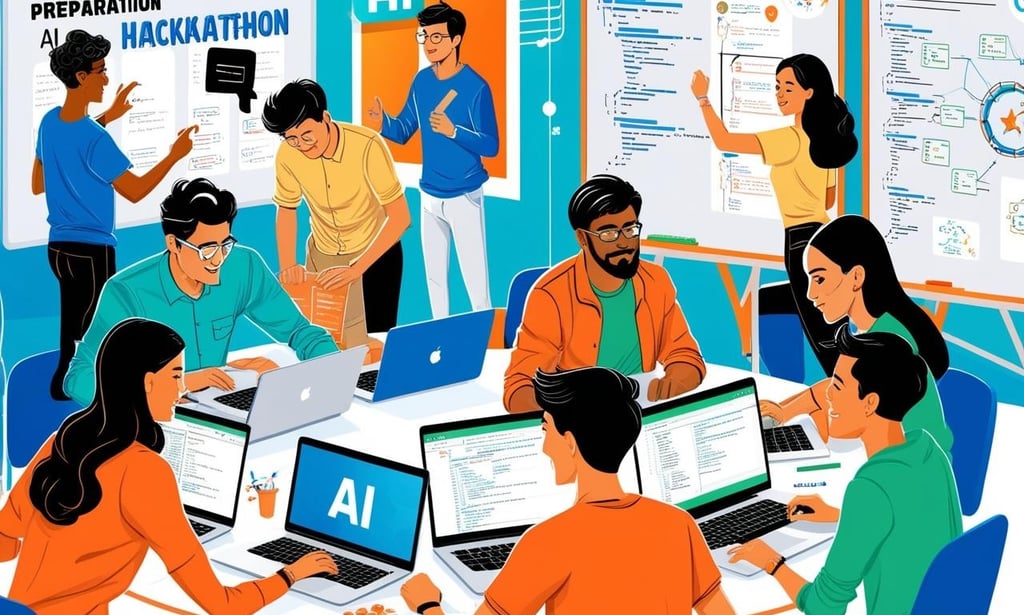AI Competitions and Hackathons: Preparing for Your First Event
"Prepare for your first AI competition or hackathon with this informative guide. Learn essential tips, strategies, and resources to excel in AI events, from understanding the challenges to leveraging AI tools, helping you compete with confidence and creativity."
EDUCATION


Artificial Intelligence (AI) competitions and hackathons have become a dynamic platform for individuals and teams to showcase their skills, solve real-world problems, and connect with like-minded professionals. These events are not only about coding but also about creativity, collaboration, and innovation. For anyone interested in AI, participating in these competitions can be a transformative experience.
This comprehensive guide is designed to help you prepare for your first AI competition or hackathon, ensuring you make the most of the opportunity.
Why Participate in AI Competitions and Hackathons?
1. Skill Development
AI competitions provide hands-on experience in solving complex problems, allowing participants to apply theoretical knowledge to practical challenges.
2. Networking Opportunities
Meet and collaborate with industry professionals, researchers, and fellow AI enthusiasts.
3. Real-World Problem Solving
Tackle challenges that have real-world implications, such as optimizing supply chains or predicting customer behavior.
4. Recognition and Rewards
Gain recognition within the AI community, win prizes, and open doors to career opportunities.
Types of AI Competitions and Hackathons
1. Machine Learning Competitions
- Focused on predictive modeling, classification, regression, or clustering tasks.
- Examples: Kaggle, DrivenData.
2. Natural Language Processing (NLP) Challenges
- Tasks include sentiment analysis, chatbot development, and text summarization.
- Examples: SemEval, Hugging Face Datasets challenges.
3. Computer Vision Competitions
- Involve tasks such as object detection, facial recognition, and image segmentation.
- Examples: ImageNet Challenge, CVPR contests.
4. AI for Social Good
- Focus on solving problems related to healthcare, education, or environmental sustainability.
- Examples: AI for Good Global Summit Hackathons.
5. Corporate-Sponsored Hackathons
- Organized by companies to solve specific business challenges.
- Examples: Microsoft AI Challenges, IBM Watson AI XPRIZE.
Preparing for Your First AI Competition
Step 1: Understand the Event Format
- Research the competition’s objectives, timeline, and deliverables.
- Familiarize yourself with the rules, submission criteria, and evaluation metrics.
Step 2: Build a Strong Team
- Collaborate with individuals who bring diverse skills to the table, such as data scientists, developers, and domain experts.
- Define clear roles and responsibilities for each team member.
Step 3: Enhance Your AI Skills
- Brush up on key topics such as machine learning algorithms, data preprocessing, and model evaluation.
- Practice coding in Python and explore popular libraries like TensorFlow, PyTorch, and Scikit-learn.
Step 4: Choose the Right Tools
- Data Processing Tools: Pandas, NumPy.
- Visualization Tools: Matplotlib, Seaborn.
- Modeling Tools: XGBoost, LightGBM.
- Cloud Platforms: Google Colab, AWS, Azure.
Step 5: Work on Previous Challenges
- Solve past problems from platforms like Kaggle or DrivenData to understand typical competition structures and datasets.
- Participate in smaller hackathons or online contests to gain experience.
Key Strategies During the Event
1. Understand the Problem Statement
- Carefully analyze the challenge and identify the main objectives.
- Ask questions during Q&A sessions to clarify doubts.
2. Plan Your Approach
- Break down the problem into smaller tasks and set achievable milestones.
- Prioritize tasks based on their impact on the final solution.
3. Focus on Data Exploration
- Perform exploratory data analysis (EDA) to uncover patterns, trends, and anomalies.
- Use visualization tools to better understand the data.
4. Choose the Right Model
- Experiment with baseline models before moving to complex algorithms.
- Use ensemble methods like Random Forest or Gradient Boosting for improved accuracy.
5. Iterate and Optimize
- Continuously refine your model based on feedback and performance metrics.
- Avoid overfitting by using techniques like cross-validation and regularization.
6. Document Your Work
- Keep detailed notes on your methodology, assumptions, and results.
- Prepare a clear and concise presentation for the judges.
Common Challenges and How to Overcome Them
1. Time Constraints
- Use time management techniques to stay on track.
- Focus on completing a functional prototype before refining details.
2. Data Quality Issues
- Handle missing values, outliers, and inconsistencies during preprocessing.
- Use synthetic data generation if the dataset is too small.
3. Team Conflicts
- Foster open communication and ensure everyone’s opinions are heard.
- Resolve conflicts quickly to maintain productivity.
Post-Event Reflection
1. Evaluate Your Performance
- Analyze what worked well and what could be improved.
- Seek feedback from judges and teammates.
2. Update Your Portfolio
- Showcase your project on platforms like GitHub or LinkedIn.
- Write a blog post detailing your experience and solution.
3. Stay Connected
- Network with participants and organizers for future opportunities.
- Join AI communities and forums to stay updated on upcoming events.
Resources to Help You Prepare
1. Online Learning Platforms
- Coursera: Machine Learning by Andrew Ng, AI for Everyone.
- edX: AI for Beginners, Deep Learning Essentials.
2. Books
- Hands-On Machine Learning with Scikit-Learn, Keras, and TensorFlow by Aurélien Géron.
- Python Machine Learning by Sebastian Raschka.
3. Community Forums
- Kaggle Discussions.
- Reddit’s r/MachineLearning.
4. Practice Platforms
- Kaggle: Offers datasets and competitions to practice skills.
- HackerRank: Coding challenges with AI and data science focus.
Conclusion
Participating in AI competitions and hackathons is a rewarding experience that sharpens your skills, expands your network, and enhances your career prospects. By preparing thoroughly, collaborating effectively, and staying adaptable, you can make your first event a success.
Explore more insights and resources about AI and its applications at "Best AI Podcasts and YouTube Channels to Follow in 2024". Your journey into the world of AI starts here!

